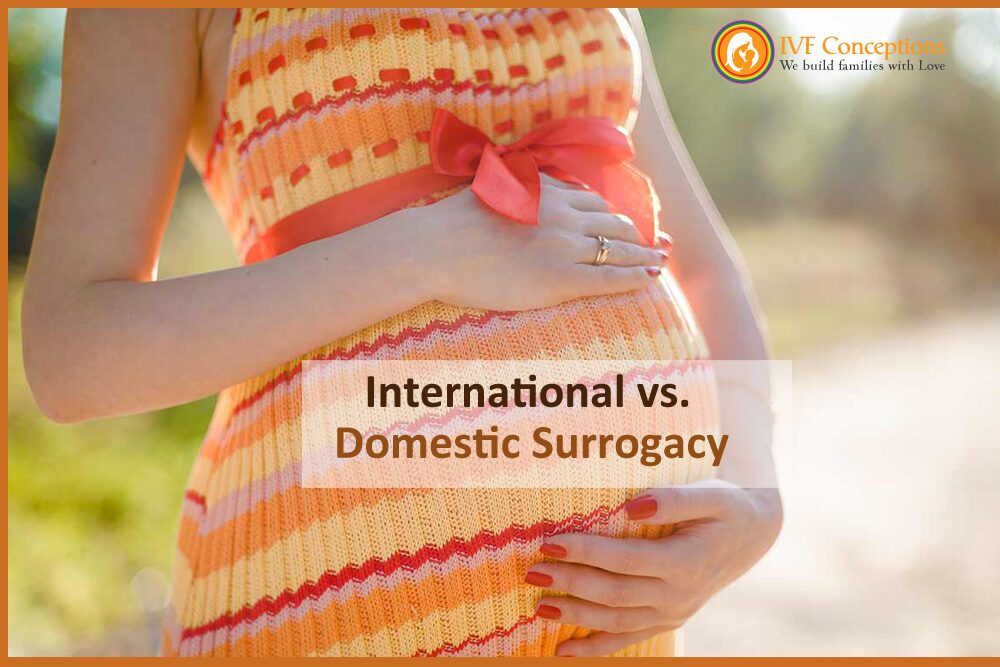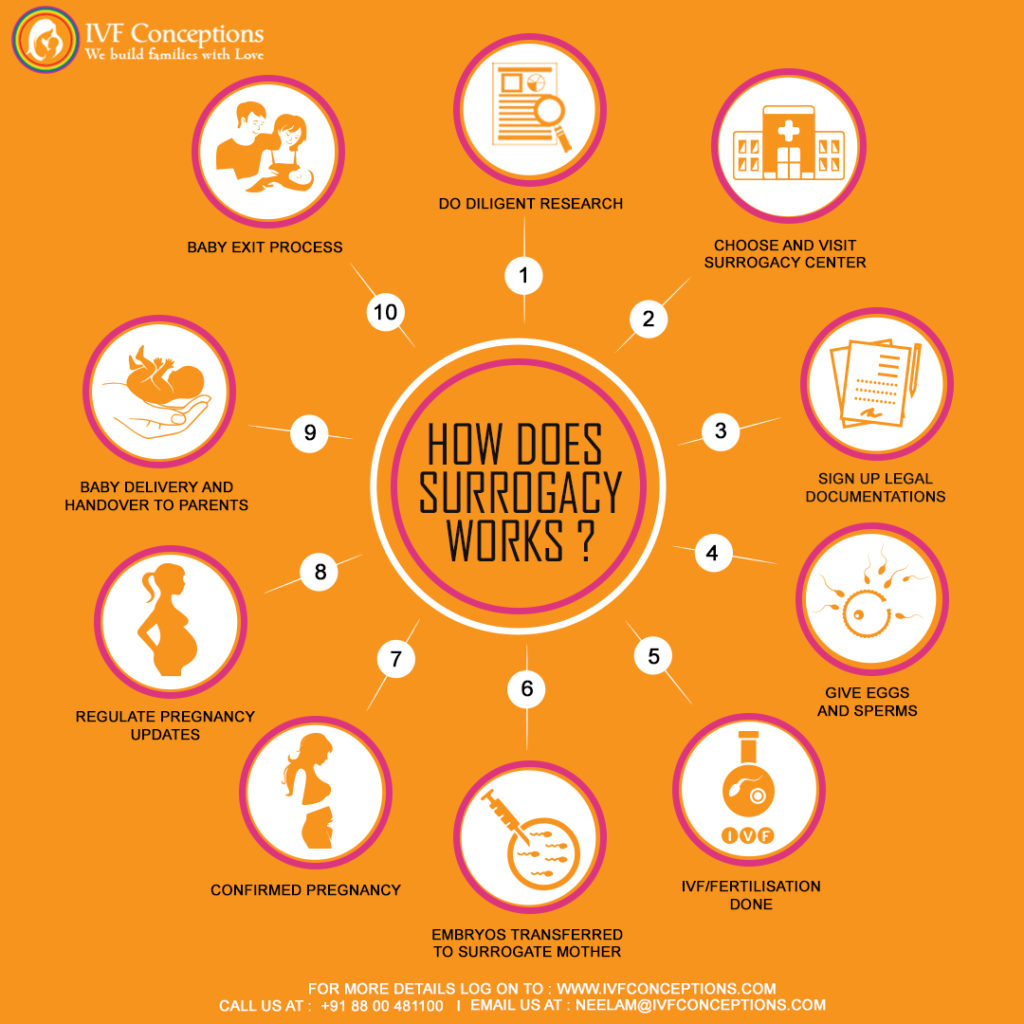Surrogacy pregnancy is a fantastic means of creating families for many childless couples, single males, and gay couples.


We understand that all human beings have a profound desire to start or expand their families. Surrogacy is a method of assisted reproduction that empowers intended parents who are unable to conceive on their own.
In this comprehensive guide, we will walk you through surrogate pregnancy with the intricate process of surrogacy, shedding light on its meaning, benefits, costs, and the unique guide and support we provide at IVF Conceptions, a trusted surrogacy consulting agency.
Surrogacy is a remarkable journey that allows intended parents to fulfill their dreams of having a child. It is a collaborative process where intended parents partner with a gestational surrogate who selflessly carries and nurtures the baby until birth. Surrogacy is sought after by individuals and couples who face various challenges in conceiving naturally.

 Gestational surrogacy is sometimes one of the only ways to become parents for many childless couples, and this can be done via surrogacy pregnancy.
Gestational surrogacy is sometimes one of the only ways to become parents for many childless couples, and this can be done via surrogacy pregnancy.
The surrogacy process has high success rates in different parts of the world, especially in the USA. Although surrogacy is gaining momentum, what is the meaning of surrogate pregnancy meaning or other related terms?
In this article, we will cover the terms related to surrogacy so that would-be parents know what surrogate pregnancy means and how surrogacy works beforehand.
Surrogacy pregnancy is a process in which a woman agrees to carry the baby for the intended parents.
After the child is born, the birth mother authorizes and legalizes the intended parents to be the formal guardians of the child. She gives the formal custody of the child to the intended parents.
Begin your surrogacy journey with IVF Conceptions today!
Mobile: +91-8800481100 ( WhatsApp, Line, Viber)
Email: neelam@ivfconceptions.com
Web: www.completesurrogacy.com


Types of Surrogacy Pregnancy
Surrogacy pregnancy can be broadly two types – Traditional Surrogacy and Gestational Surrogacy.
#1. Traditional Surrogacy – In traditional surrogacy, the egg utilized for the process of fertilization belongs to the surrogate, making a biological link between the surrogate and the child.
Traditional surrogacy is considered to be more complex and controversial than gestational surrogacy. This is because of the fact that there is a biological relationship between the surrogate and the child that often complicates the matter in case the validity of surrogacy or parental rights is challenged.
#2. Gestational Surrogacy – In the case of gestational surrogacy, the eggs from the intended mother or from the egg donor are used to fertilize with the sperm of the intended father or that of a sperm donor.
The embryos made are then transferred to the surrogate who carries the child until birth. In this case, there is no biological relationship between the surrogate and the child.
Some lesbian couples find the option of gestational surrogacy attractive because of the fact that in this case, one woman can contribute the egg and others can carry the child until birth.
Therefore, surrogacy might include ART (Assisted Reproductive Treatment) such as In Vitro Fertilisation (IVF) or Intra-Uterine Insemination (IUI) using –
- The donor’s egg
- The surrogate mother owns an egg
- The egg of the intended mother
- Sperm from a sperm donor
- Sperm of the intended father
Apart from traditional and gestational surrogacy, surrogacy can also be classified on the basis of the payment the surrogate is receiving in two types – Commercial surrogacy and Altruistic surrogacy.
More resources on this topic: Surrogate Pregnancy Meaning
Surrogacy definitions and meaning that parents should know
How Much Does Surrogacy Cost? Everything You Need To Know (in 2023)
Best Countries for Surrogacy ( In 2023)That Parents Need To Know

 #1. Commercial surrogacy – In commercial surrogacy, the birth mother or the surrogate receives payment for carrying the baby for the intended parents.
#1. Commercial surrogacy – In commercial surrogacy, the birth mother or the surrogate receives payment for carrying the baby for the intended parents.
Intended parents pay the fees or compensation to the surrogate apart from the required expenses during the process of surrogacy. Such type of surrogacy is allowed in many countries like the USA, Russia, Georgia, and Ukraine.
#2. Altruistic Surrogacy – In an altruistic surrogacy, it is important to ensure that the intended parents only pay or reimburse the actual surrogacy pregnancy cost to the surrogate.
Hopeful parents are required to pay the basic expenses that have been incurred during the process of surrogacy. Some of these expenses of altruistic surrogacy are:
- Legal fees,
- Clothing bills
- Life insurance premiums
- Travel fees associated with the medical appointments
- Parking fees associated with the medical appointments
- Medical expenses not incurred
- Any other expenses incurred during surrogacy.
In many countries, those who have banned commercial surrogacy have paved way for the altruistic surrogacy. Some of them include Canada, Australia, and the UK.
In altruistic surrogacy advertising the surrogate parent or commissioning the parent is not allowed generally.
More topics about Surrogate Pregnancy Meaning
- Surrogate pregnancy process
- Surrogate pregnancy agencies
- Surrogate pregnancy compensation
- Surrogate pregnancy requirements
- Surrogate pregnancy pros and cons
- Surrogate pregnancy vs. Adoption


Terms used for Understanding Surrogate Pregnancy Meaning?
- Surrogate – The woman who agrees to carry the child for the intended parents is termed a surrogate.
- Intended parents – The parents for whom the surrogate is carrying the child and to whom the child is handed over after the birth are known as intended parents. They can be single, married couples, or same-sex couples, who wish to build their families through surrogacy.
- Egg Donor – In case you are opting for gestational surrogacy, use the egg of the other person other than the intended mother. That person is known as the egg donor
- Sperm donor – The person who donates the sperm in the absence of the sperm of the intended father is known as the sperm donor.
Since surrogacy is a life-changing process for everyone, it is important to consult the legal partner of the surrogate, if she has one.
Surrogacy Agreements for the Surrogate Mother Process
Surrogacy agreements/contract is the most common and vital agreement in the process of surrogacy. Both the surrogate and the intended parents are required to sign this agreement before beginning the journey of surrogacy pregnancy.
Most of the country’s laws also demand surrogacy agreements signed duly by both the surrogate (and her civil partner, if applicable) and the intended parents.
The contract includes the responsibilities of both the surrogate and the intended parents. Only after legal clearance, further medical procedure is allowed.
Understanding How Surrogacy Works?
Surrogacy is a multifaceted process that requires medical, legal, and emotional support. The journey begins at a fertility clinic, where embryos are created through in vitro fertilization (IVF).
Intended parents may use their own genetic material or opt for an egg donor if needed. At Circle Surrogacy, we ensure that only gestational surrogacy is practiced, meaning that the surrogate has no genetic relationship to the child she carries.
Once the embryos are created, they are transferred to the gestational carrier’s uterus. Through meticulous medical screenings, surrogate medications, and embryo transfer, the journey progresses toward the confirmation of pregnancy.
Throughout this process, Circle Surrogacy offers unwavering support to both intended parents and surrogates, fostering a nurturing environment for the development of a beautiful relationship.

 Eligibility criteria for the surrogacy pregnancy process
Eligibility criteria for the surrogacy pregnancy process
Not everyone can enter into surrogacy agreements. Some states don’t allow foreign nationals to be a part of the surrogate agreement in their own country like India.
Some countries don’t allow single parents or homosexuals to be a part of the agreement. Georgia and Ukraine are examples of such countries.
Surrogacy countries like the USA allow most of surrogacy agreements based on the state where surrogate mothers live.
While in some countries the surrogacy procedure together is banned.
Also, not everyone can be a surrogate to anyone. In some countries, the surrogate has to be a friend or a family member. While some countries freely allow anyone to be a surrogate. However, they have certain restrictions like age limit, having a baby of their own, and sound medical and emotional ability.
In countries like the UK, the parentage order is required to transfer the custody of the child from a surrogate mother to the intended parents. This process of parentage order differs in each state. In parentage order, it is important to have the consent of the surrogate in some states while it is not in the case of the other states.
So, you see each country has its own criteria to accept intended parents and surrogate mothers. That is why while noting for international surrogacy, consult an experienced surrogacy consultant who can assist and support the roadmap of each country and then give the best options as per your specific case. The damage to do a mistake is too high so better make an informed decision and not have a bitter experience later on.
Additional Guides for Surrogate Mother:
Find a Surrogate Mother With or Without an Agency
In Which Country I Find Low-Cost Surrogate Mothers (in 2023)?
How can I Find a Surrogate Without Agency
What is the Age Limit for Surrogate Mothers
How Much Does Surrogacy Cost Using Family Member
How to Start the Gestational Surrogacy Process? A step-by-step guide for Beginners
How Much Does Surrogacy Cost? Everything You Need To Know (in 2023)
Surrogacy Pregnancy Cost and Practicalities
Gestational surrogacy costly is exorbitantly in the USA. As becoming parents via surrogacy means a medical, legal, and logistic process, and then the admin part of hiring and taking care of surrogate mothers throughout the pregnancy.
The surrogacy agency fee is an added burden on parents. So, the overall costs of surrogacy pregnancy should be kept in mind before starting. Besides this keeps at least 10 to 15% of the money aside for unseen events.
In some countries, surrogacy cost is very expensive as in the USA. But, surrogacy pregnancy cost outside the USA is quite cheaper, like in Colombia, Georgia, and Ukraine.
More resources:
How to reduce surrogacy costs?

 Conclusion
Conclusion
To have a successful outcome and a hassle-free surrogacy experience, it is crucial that wishful parents should know the fundamental aspects of the surrogacy pregnancy, including the cost, legal, and logistic process around it.
To understand the surrogate pregnancy process, it is recommended to get in touch with an experienced surrogacy agent, who can help you with understanding the process and the best surrogacy country.
If you’d like to learn more about IVF, Egg Donation, or surrogacy services globally, check out the rest of our website: IVF Conceptions. We offer legally secure and affordable surrogacy consulting services for FREE.
Begin your surrogacy journey with IVF Conceptions today!
Mobile: +91-8800481100 ( WhatsApp, Line, Viber)
Email: neelam@ivfconceptions.com


FAQs About Surrogate Pregnancy Meaning
- What is the definition of surrogate pregnancy?
Surrogate pregnancy, also known as gestational surrogacy, refers to a situation where a woman, known as the gestational surrogate or carrier, carries and delivers a child on behalf of another individual or couple, known as the intended parents. In this arrangement, the gestational surrogate does not have a genetic connection to the child she carries. Instead, the embryo is created through in vitro fertilization (IVF) using the eggs and sperm of the intended parents or donors. The embryo is then transferred to the gestational surrogate’s uterus for gestation and birth.
- How does surrogate pregnancy work?
Surrogate pregnancy involves several steps. First, the intended parents or a surrogacy agency selects a gestational surrogate. The gestational surrogate and intended parents then undergo medical and psychological screenings. If all requirements are met, the process proceeds to in vitro fertilization (IVF), where an embryo is created using the eggs and sperm of the intended parents or donors.
The resulting embryo is transferred to the gestational surrogate’s uterus, and if successful, she carries the pregnancy to term and gives birth to the child. Throughout the process, legal contracts are typically established to clarify the rights and responsibilities of all parties involved.
- What are the types of surrogate pregnancies?
There are two main types of surrogate pregnancy: gestational surrogacy and traditional surrogacy.
Gestational surrogacy is the most common type and involves the gestational surrogate carrying a child conceived through IVF using the eggs and sperm of the intended parents or donors. The gestational surrogate is not genetically related to the child.
In contrast, traditional surrogacy involves the surrogate using her own eggs, making her genetically related to the child. Traditional surrogacy is less common and often accompanied by legal complications.
- Is surrogate pregnancy legal?
The legality of surrogate pregnancy varies across countries and jurisdictions. In some places, it is fully legal and regulated, while in others, it may be prohibited or restricted. Even where it is legal, specific regulations and requirements may exist. It is essential to consult local laws and seek legal advice to understand the legality and regulations surrounding surrogate pregnancy in a particular jurisdiction.
- What are the requirements for being a surrogate mother?
The requirements for being a surrogate mother can vary depending on the surrogacy agency or program.
- Generally, ideal gestational carriers are healthy women between the ages of 21 and 45 (preferably younger than 35).
- They should have had at least one but no more than five uncomplicated pregnancies and full-term deliveries.
- It is preferred that they have not had more than three cesarean section deliveries and have a body weight within a healthy range.
- Additionally, they undergo thorough medical and psychological screenings to ensure their suitability for the surrogacy process.
- Can same-sex couples opt for surrogate pregnancy?
Yes, same-sex couples can opt for surrogate pregnancy. Surrogate pregnancy offers a viable option for male same-sex couples who desire to have children.
In such cases, gestational surrogacy, combined with egg donation, can enable the couple to have a child genetically related to one or both partners.
- What are the risks associated with surrogate pregnancy?
Surrogate pregnancy carries certain risks, similar to those of any pregnancy. These risks include potential complications during pregnancy, such as gestational diabetes, preeclampsia, or preterm labor.
The risks can vary depending on the health of the gestational surrogate and other individual factors. Psychological risks, including emotional attachment and potential conflicts, may also arise.
It is crucial for all parties involved to undergo proper screening, obtain comprehensive medical care, and establish clear legal agreements to mitigate potential risks.
- How much does a surrogate pregnancy cost?
The cost of surrogate pregnancy can vary from $150,000 to $200,000 in the USA depending on various factors such as the country, the surrogacy agency, legal expenses, medical procedures, compensation for the gestational surrogate, and other related costs.
It is advisable to consult with surrogacy agencies or professionals who can provide specific cost estimates and breakdowns based on individual circumstances.
- Are there any emotional considerations for the surrogate mother?
Surrogacy can involve emotional considerations for the surrogate mother. The gestational surrogate may experience a range of emotions, including attachment to the child during pregnancy.
It is essential for the surrogate to have adequate emotional support throughout the process. Open communication, clear expectations, and counseling can help address emotional considerations and facilitate a positive experience for all parties involved.
- Can a surrogate mother have a genetic relationship with the baby?
In gestational surrogacy, the gestational surrogate does not have a genetic relationship with the baby. The embryo used in the IVF process is created using the eggs and sperm of the intended parents or donors, making the child genetically related to them or the donors.
The gestational surrogate’s role is to carry and nurture the pregnancy but not contribute genetically to the child.


